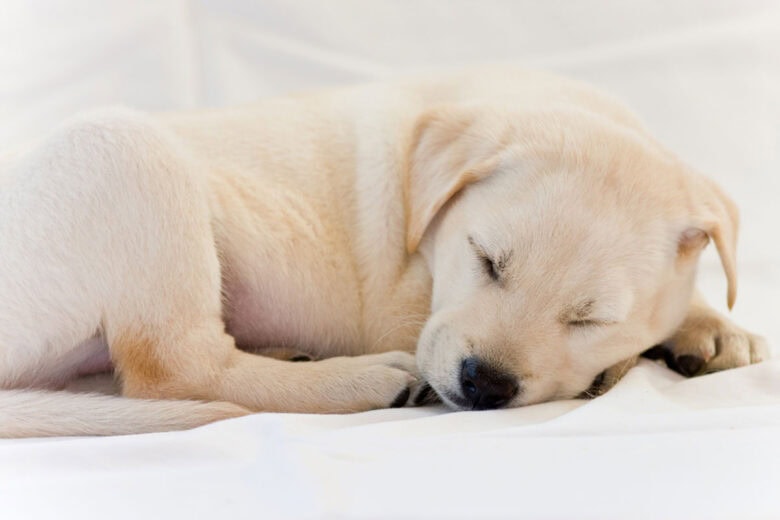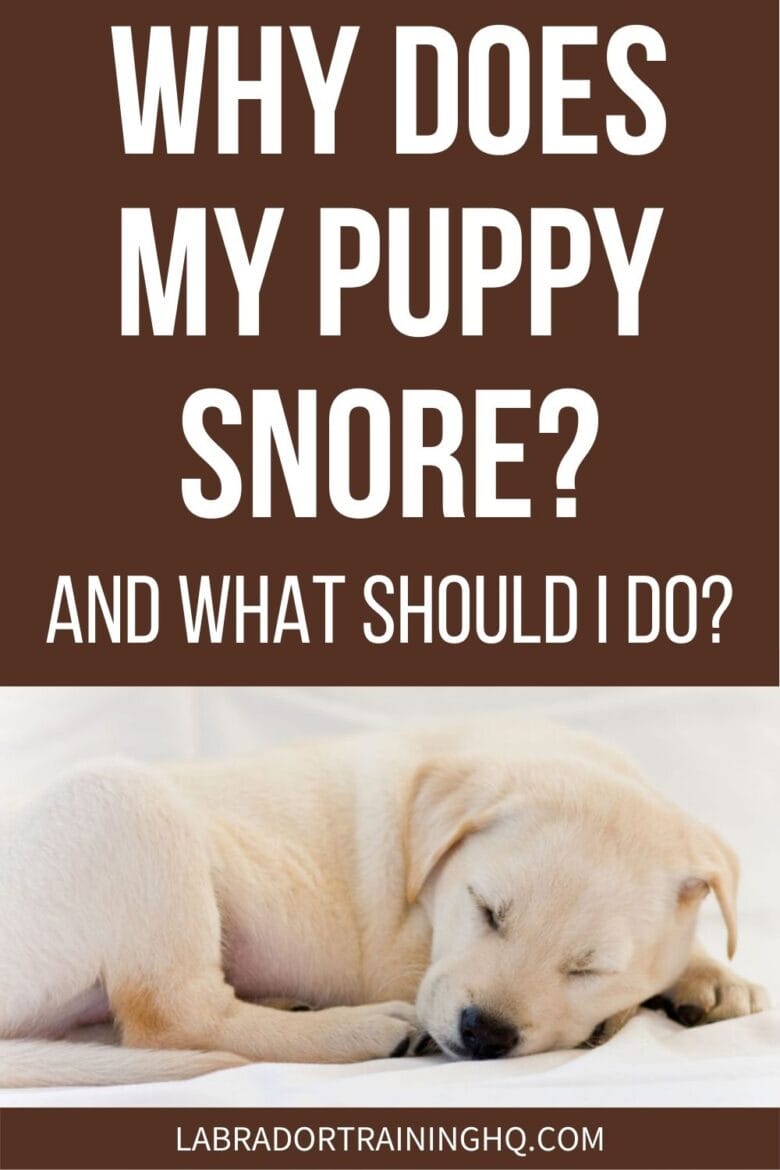This post may contain affiliate links. We may earn money or products from the companies mentioned in this post.
We all love sharing a bed or a couch, watching a movie, having an afternoon nap, and cuddling with our best puppy pal.
However, sometimes they disturb the peace because they do nothing but snore! So, why does your puppy snore and when should you be concerned?
Dogs snore for many of the same reasons that humans do, so many of the causes of their snoring will be familiar to you and you can help ease their snoring ways.
Snoring is a sign that there is some kind of obstruction in the air flow between the lungs and the nose or mouth.
Most often, it’s the soft palate that is at fault when it is in the wrong position or being compressed.

Let’s dive into why puppies snore and when you should be worried enough to seek a vet’s help.
Should I Be Worried That My Puppy Snores?
Snoring occurs when something is blocking the air from moving smoothly in and out of the body. For puppies, there could be many things that affect the way air moves in and out of their lungs.
Just like with humans, most of the time it is completely benign when your puppy snores and all you need to do is change the position of their head and the snoring will go away — just like when you roll your partner over and the snoring stops!
However, there are some issues that may cause snoring to start in the first place.
If you think your puppy is snoring more than normal, that their snoring has changed, or you hear them snoring and making choking sounds, then have a look for another cause for their noisy breathing.
Why Do Some Dogs Snore More Than Others?
Some dog breeds will snore more than others. In humankind’s bid to make some breeds look a certain way, we have interfered with the design of their skulls and bred some dogs to have a shortened, ‘flat-looking’ snout.
This flattened snout may give your dog a cute look, but it has wreaked havoc with their nasal passage and soft palette.
These are known as brachycephalic dogs and suffer from a shortened snout but a ‘normal’-sized soft palette, which blocks the airway when they sleep or relax.
Common brachycephalic breeds are:
- Boston terrier
- Boxer
- Bulldogs
- Chihuahua
- King Charles spaniel
- Pekingese
- Pug
- Shih tzu
These breeds will snore more than those with longer snouts like Labradors or golden retrievers. However, this does not mean that dogs with longer snouts that snore are fine and do not have underlying conditions.
It also does not mean you need to rush your brachycephalic dog to the vet to get surgery to open their airway.
There are differing degrees to which the soft palate blocks the airway, and most dogs are perfectly fine without medical intervention.
If you notice your brachycephalic dog snoring, seemingly stop breathing, then start snoring again then taking them to the vet is a good idea as their soft palate may be too big for their snout.
What Factors Make Snoring Worse?
There are certain conditions or environments that will worsen your dog’s snoring. Keep an eye out for these and see how they affect your puppy’s snoring.
1. Obesity
If your puppy is overweight, they will have excess flesh around their internal organs and their airways, as well as cute little pudge belly rolls.
This means the excess fat will press on the airway and make it more difficult for air to travel unimpeded, which will cause snoring.
Obesity can also lead to sleep apnea. Sleep apnea is a very rare diagnosis in dogs; however it is not unheard of.
Sleep apnea happens where your dog will suddenly stop breathing while they are asleep and then start breathing again a couple of seconds later.
A sign of sleep apnea is interrupted snoring. Sleep apnea can be deadly in dogs and should be brought to your vet’s attention as soon as you notice it.
2. Hypothyroidism
Hypothyroidism is a common ailment in dogs. This happens when the thyroid gland (which sits around part of the windpipe) does not produce a specific hormone that regulates metabolism.
If this hormone is not regulated, labored breathing while sleeping may happen, causing your puppy to snore.
A simple blood test is all that’s necessary to detect hypothyroidism, which can be treated with a daily pill.
If the cause of the snoring was hypothyroidism, then it should go away as soon as your puppy starts treatment.
3. Tooth Abscess/ Gum Disease
If your puppy has a tooth abscess or an abscess in the gum, it could be swollen and push up into the nasal cavity, which will limit their airflow. This will lead to snoring.
If your puppy suddenly starts snoring out of the blue and they do not usually snore (or snore as badly), then check their mouths for signs of redness, plaque buildup, or a bad odor.
If you suspect a rotten tooth or gum disease, get your puppy to the vet.
4. Secondhand Smoke
If there is a smoker in the home, your dog is breathing in secondhand smoke. Secondhand smoke irritates the lining of the nasal passages and lungs, inflames them, and dries them out.
This can all contribute to your puppy snoring.
Do not smoke around your pup, ask guests to not pat your dog while they are smoking, and treat your dog as you would a small child around smoke.
5. Dust/Allergens
Your dog may have allergies or their environment may be very dusty.
When you are preparing your home to bring your new puppy into it, carefully examine what cleaning products you use, what plants they may have access to, and whether there is a lot of sand or dust where they will be playing and sleeping.
The dust or allergens (such as pollen, chemicals, grass, and pet hair) will irritate the lining of the airway and cause it to become inflamed and dry.
This in turn will interrupt the flow of air and cause them to snore.
6. Dry Atmosphere
You may live in an area that has a particularly dry atmosphere and this may affect your dog’s snoring.
If you notice nearly everyone in your household, including your pets, snoring, then you may have a dry atmosphere.
Try out a humidifier and see if that changes the intensity of your puppy’s snoring. If it does, then there’s a good chance it will help with the humans snoring in your home, too!
7. Reflux
If your puppy suffers from acid reflux (heartburn), the stomach acid could be pushing up against their lungs and causing them to snore.
Obesity and a very acidic diet both add to acid reflux and make it worse.
Watch your puppy when they relax and have a nap after eating: Is their snoring better or worse than when they have not eaten in a while?
If their snoring is worse when they nap after eating, they may have an issue with acid reflux and will need to see the vet.
8. Sleeping Position
The most common cause for snoring is a funny head position. Puppies will often fall asleep mid-play time in the most unusual positiuons, which may put pressure on their airway and cause them to snore.
If you think their position is the cause of their snoring, gently turn them so they lay on their side, where there is minimal pressure on their throat and snout.
FAQs About Why Dogs Snore
When should I take my dog to the vet for snoring?
If you are worried about the intensity or frequency of your puppy’s snoring, then take them to the vet. Rather be safe than sorry.
However, there are certain things you can rule out before an expensive vet visit.
Check your puppy’s weight against what it should be for their age, breed, and height. If they are overweight, this is the most likely cause for their snoring.
Put a humidifier in the home and see if it makes a difference in the way in which your dog snores. If it does, then their airway is quite dry.
If you notice your dog snoring, stop breathing, and then carry on snoring and even making choking noises, then take them to the vet as there is something blocking their airway.
Why does my puppy sleep with a toy in its mouth?
Your puppy may have figured out that they have something blocking their airway all on their own and will intentionally go to sleep with a toy in their mouth to prop their jaws open.
If you notice that your puppy goes to sleep with a toy in its mouth, take them to the vet to check that their airway is unobstructed.
Barking Off On Why Puppies Snore
Puppies snore for many reasons and most of those are benign.
However, snoring may be a sign of an underlying condition so it should never be ignored.
If you want to figure out why your puppy snores, go through our list and try to rule out as many potential causes as you can at home before taking them to the vet, so your vet will have a better idea of what could be wrong.
Save To Pinterest

Top Picks For Our Dogs
- BEST PUPPY TOY
We Like: Calmeroos Puppy Toy w/ Heartbeat and Heat Packs - Perfect for new puppies. Helps ease anxiety in their new home. - BEST DOG CHEW
We Like: Bones & Chews Bully Sticks - All of our puppies love to bite, nip, and chew. We love using Bully Sticks to help divert these unwanted behaviors. - BEST DOG TREATS
We Like: Crazy Dog Train Me Treats - One of our favorite treats for training our service dog puppies. - BEST FRESH DOG FOOD
We Like: The Farmer's Dog - A couple months ago we started feeding Raven fresh dog food and she loves it! Get 50% off your first order of The Farmer's Dog.
For a list of all the supplies we get for our new service dog puppies check out our New Puppy Checklist on the PuppyInTraining.com blog.
2 comments
This post really gave me a lot of insight into the world of puppy snoring and how it can vary from breed to breed. I found it particularly interesting that some puppies will naturally snore due to their anatomy, while other breeds might snore more as they get older due to issues with their respiratory system or weight gain. Knowing that snoring can be both normal and excessive is reassuring, but also provides important information on when we should be worried and seek help from a veterinarian. I’m so thankful for this blog post! It has given me valuable information that’ll help me look after my pup better.
That is perfect timing as we have had our german shepherd tested for allergies as she has been biting her hot spot areas on her fur. In fact, now that I read your article, I realized that she had been snoring as well and may be congested. I will let my vet know as I think she may suffer from season allergies. Thank you for your helpful research.
Cheers!
Lulu